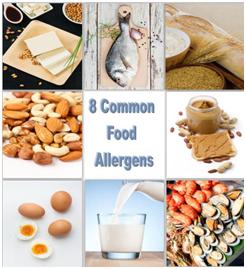
General Information
Allergies vs. Intolerances
What is food allergy?
A food allergy is an abnormal response of the body to a certain food. It is important to know that this is different than a food intolerance, which does not affect the immune system, although some of the same signs may be present.
What causes food allergy?
Before having a food allergy reaction, a sensitive person must be exposed to the food at least once before. It is the second time the person eats the food that the allergic symptoms happen. At that time, when IgE (Immunoglobulin E) antibodies react with the food, histamines are released, which can cause hives, asthma, itching in the mouth, trouble breathing, stomach pains, vomiting, or diarrhea.
What is the difference between food allergy and food intolerance?
Food allergy causes an immune system response, causing symptoms that range from uncomfortable to life-threatening. Food intolerance does not affect the immune system, although some symptoms may be the same as in food allergy.
What foods most often cause food allergy?
Approximately 90 percent of all food allergies are caused by eight foods:

Eggs
Fish
Milk
Peanuts
Shellfish
Soy
Tree nuts
Wheat
More information is available through the continuation of this article on Eat Right for Life; along with other related resources, articles, and interactive tools, visit Food Allergies in the Eat Right for Life Health Library.






